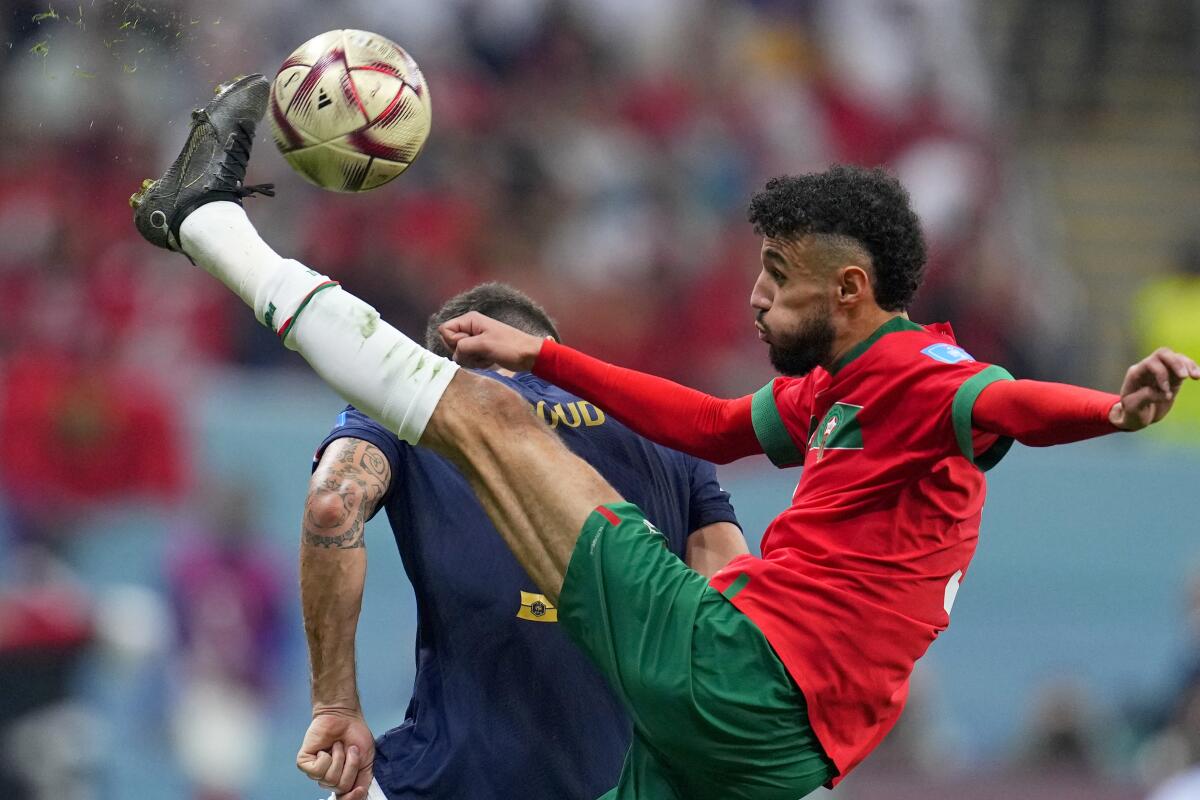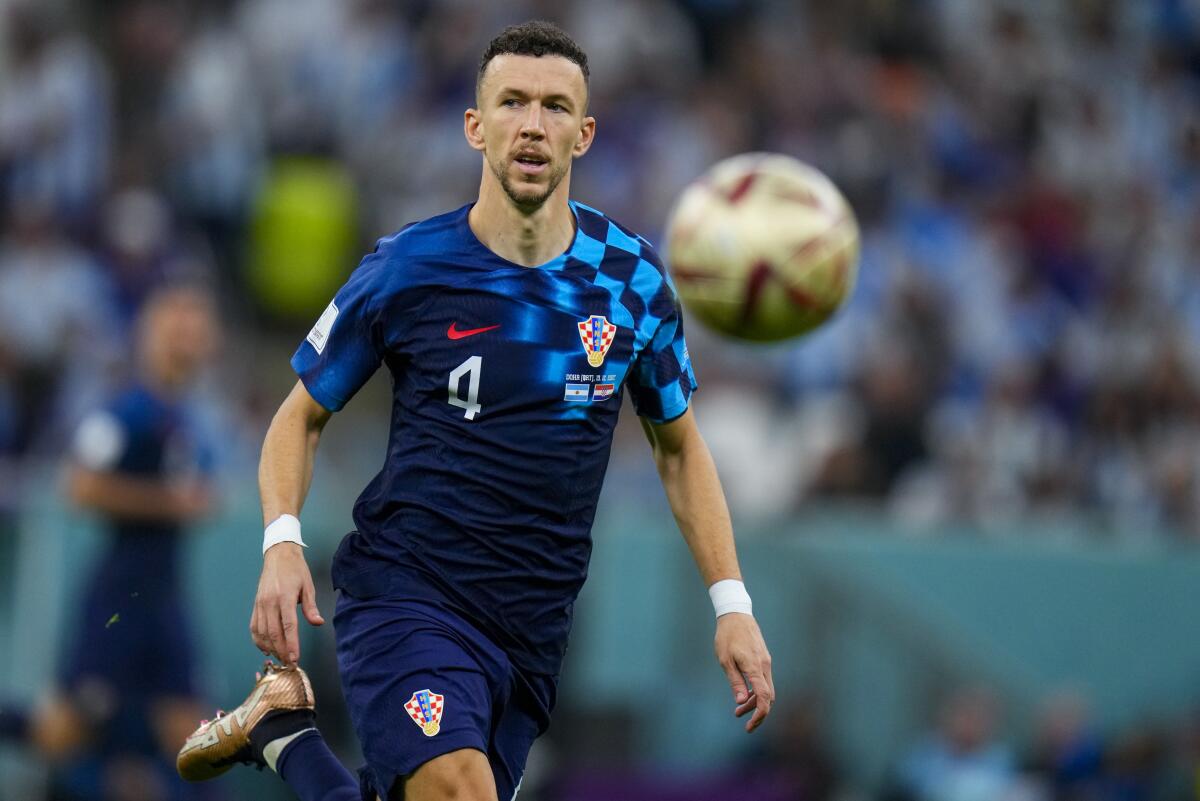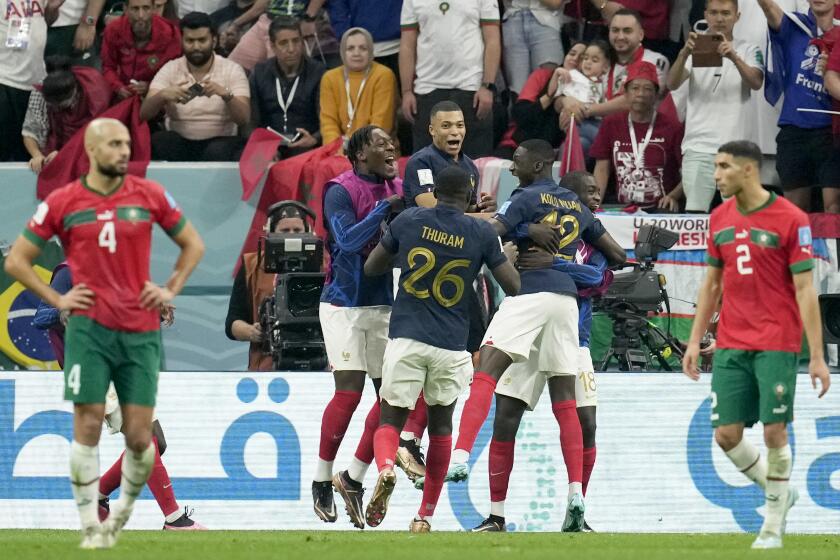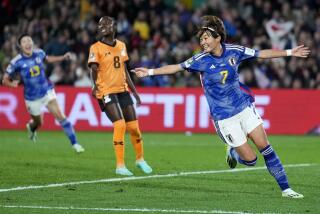Why does the World Cup third-place game exist? It’s all about the money

- Share via
AL RAYYAN, Qatar — It’s one of the most pointless games in international sports, a match no one wants to play and one few remember once it’s over.
But the World Cup’s third-place game isn’t going anywhere, FIFA says. This year’s consolation final will be played Saturday between Croatia and Morocco and the game is on the schedule for the next tournament in 2026. So the question becomes why?
As with most things involving FIFA, the answer is money. The World Cup has had a third-place game since 1954 and the money it gets from broadcasters and sponsors makes it meaningful for FIFA’s bank account.
But where else do semifinal losers meet to determine which one is better?
It happens in Olympic sports but that’s because there’s a bronze medal on the line. Do the two league championship losers in baseball meet in a consolation World Series to separate third from fourth? Before the merger with the AFL, the NFL used to have something called the Playoff Bowl (originally the Runner-Up Bowl), a made-for-TV event matching the second-place teams from the Eastern and Western conferences.
It lasted 10 years, never sold out and disappeared without a whimper.
Saturday’s World Cup consolation final will match teams that have already met in this tournament, Croatia and Morocco having played to a scoreless draw in their group-play opener. Both would remain unbeaten until the semifinals — making them the last undefeated teams — before Croatia fell 3-0 to Argentina and Morocco was beaten by France 2-0.
So while Argentina and France will face off Sunday to determine the champion, Croatia and Morocco will meet to determine … well, nothing really. The winner will take home bronze medals and $27 million in prize money. The losers get $2 million less — and no medals.
With the prize money for the Qatar World Cup totaling $440 million, the difference between third and fourth is little more than a rounding error. (There are also the medals, though!)
In terms of prestige, the game is worth much less. Even casual fans know that Brazil got two goals from the incomparable Ronaldo to win a record fifth World Cup title in the 2002 final. But who won the third-place game that year? (It was Turkey.)
The idea that both teams aren’t fully invested in the consolation final is borne out by the final scores too, with the loser failing to score in the last two.
Following the disappointment of their semifinal losses, neither coach for Croatia or Morocco seemed excited about playing for a seventh time in three weeks. Neither did the exhausted players who, in this unusual World Cup year, are returning to club teams.

For Morocco, the physical turnaround will be just as difficult as the mental one since it is dealing with several injuries and has a day less than Croatia to prepare.
“It’s going to be a challenge. We have a lot of players on their last legs,” said Morocco coach Walid Regragui, who lost defender Nayef Aguerd to injury moments before the semifinal then had to sub out captain Romain Saiss and outside back Noussair Mazraoui because of injuries before the start of the second half. That weakened back line didn’t allow an opponent to score in Morocco’s first five games.
“We gave everything,” Regragui added. “They’ve gone as far as they could.”
Regragui has little option but to clear his bench. Four of the 26 players on his roster have yet to appear in a game at this World Cup and five others have played less than 80 minutes. The coach promised to reward some of them against Croatia.
“We have a lot of players who haven’t played much,” he said. “All of those squad players have made a great contribution and haven’t played many minutes.”
Theo Hernández and Randal Kolo Muani score to send defending champion France past Morocco and into the World Cup final against Argentina.
Four of those nine players are younger than 26 — Morocco had the fifth-youngest team in Qatar — so the World Cup experience could pay dividends down the road. However, ending this tournament with two losses in four days would be a bitter way to end a World Cup in which Morocco made history, becoming the first African and first Arab nation to reach the final four.
Croatia is in a different position. After reaching the final in 2018, where it lost to France, Croatia came to Qatar as one of the older teams in the tournament, and Saturday’s game probably will mark the last World Cup appearances for defender Dejan Lovren, 33, midfielder Luka Modric, 37, and forward Ivan Perisic, 33. Modric has played more games (161) than any player in Croatian history and Perisic is tied for second in goals with 33.
“They achieved great things,” coach Zlatko Dalic said. “They’re the golden generation of Croatian football.
“A couple of them are at an age where it will be hard to play at the World Cup in 2026.”
And Modric made it clear he wanted his last World Cup game to end with in victory.
“Win the match and go back to Croatia with a medal,” he said of his goals Saturday. “We need to leave everything to win the bronze medal and let our fans celebrate one more time.”










